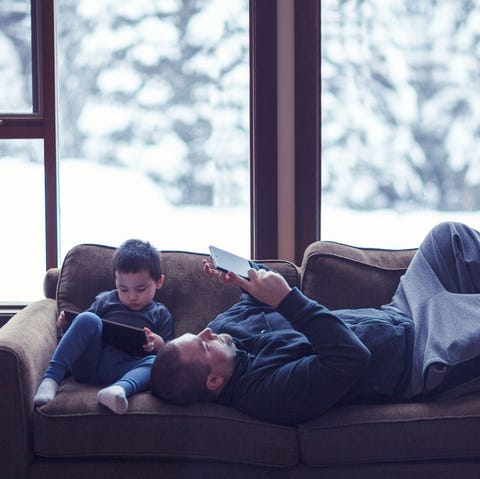
With daylight savings time having come to an end and the celebration of the extra hour to sleep in a distant memory, many of us are left with the harsh reality that: 1) we’re waking up in total darkness and really do not want to get out of bed; 2) the days are getting much shorter and that quick jog around the neighborhood we used to enjoy after work is now a harrowing headlamp-lit adventure; and 3) our daily blast of sunlight seems more like a stingy dose of overcast gray hues. This state of diminished light can have serious effects on our sleep and mood as winter looms. But understanding how light affects your body can help you manipulate the light in your environment and design a light plan to improve your rest, well-being, and overall health.
Why you feel drained
Within every brain is a central timekeeper called the suprachiasmatic nucleus (SCN). The SCN takes in cues from your surroundings—like light and temperature—and uses them to determine the timing of virtually all of our biological processes. Everything from digestion to hormone rhythms and even to athletic performance—it’s all governed by this tiny clock in our brain. And like a clock, our SCN needs to be set periodically. Unfortunately, taking a look at the time on your iPhone screen will not do the trick. Instead our SCN relies on a small group of biological inputs to make these adjustments, chief among them is light.
Light levels and quality are detected by special cells in our eyes call retinal ganglion cells (RGC). These cells measure the light (specifically the blue/green wavelengths) in the environment and when light is diminished, these cells (via the SCN) signal a small gland in our brain (the pineal gland) to secrete melatonin. Melatonin has a sleep-promoting effect on us and so we tend to get sleepy when the sun goes down. By manipulating light in our environment, we can dramatically alter our sleep patterns. So how do we go about doing it?
Mimic sunset inside the house
It’s essential that in the evening, as the sun is going down, the light that our eyes are seeing is also going down. You can lower all the light you’re exposed to in several ways.
• Install dimmer switches. A quick trip to the hardware store will reveal a multitude of these switches that can be turned down after dinner to give your home the dark feel of a Christopher Nolan Batman movie. If dim light’s not your style, several lightbulbs on the market allow you to keep your rooms bright because the lighting contains no blue-green. One good one is the Soraa Healthy bulb, $18.95).
• Block light from screens. As the evening comes around, dimming televisions and laptops (if they do not do so automatically) can be helpful. Free apps like f.lux can slowly turn down and eliminate the blue and green light from your computer screens. Or, invest in some smoky quartz Swanwick blue blocker glasses (Swanwick, $89.00), so you can watch your next episode of Jack Ryan without letting the light from your screen keep you awake (although the lenses may make everyone look a little jaundiced).
Make your room ultra dark
• Cover up anything that creates light or lets it in. Blackout shades can be helpful as can a comfortable sleep mask. Make sure that lights from electronics are obscured. (Ideally your phone will be charging in another room).
Wake up to light (even if you’re up before the sun is)
• Create artificial sunrise. A slowly building light is a wonderful way to awaken. The Philips Wake-Up Alarm Clock with Sunrise Simulation ($49.99, Philips), provides a slowly building full-spectrum light. That means it has plenty of blue-green pop to awaken your brain.
• Light your eyes. For a more Tron-like feel, try a pair of Re-Timer goggles ($199, Retimer). These rechargeable glasses have some blue-green LEDs implanted in them, giving you a hit of this melatonin-suppressing light. Pop them on every time you awaken.
Keep it light
As the day progresses, seek natural light whenever possible. Work or eat lunch outside if you can; walk around outside instead of sitting in a dimly lit breakroom. Any chance you have to remind your brain what time it is via light will pay big dividends when you’re trying to sleep.
Light is a major player in determining the quality of your sleep. The waning light of winter doesn’t have to be a drag when you make simple changes to your surroundings.
W. Chris Winter, M.D., is a sleep specialist at Charlottesville Neurology and Sleep Medicine in Virginia and is the author ofThe Sleep Solution: Why Your Sleep is Broken and How to Fix It.
Source: Read Full Article
